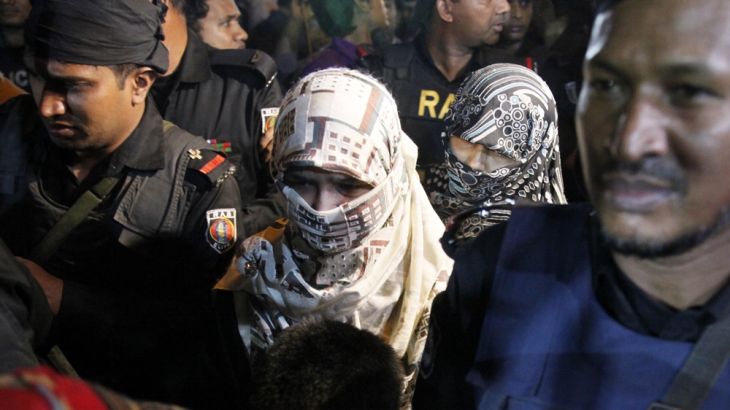Bangladesh hangs opposition figures for war crimes
General strike called to protest against hanging of Ali Ahsan Mohammad Mujahid and Salahuddin Quader Chowdhury.

Thousands of extra police and border guards have been deployed in Dhaka and other major cities and towns of Bangladesh in advance of a general strike called to protest against the executions of two opposition politicians for war crimes.
The security measures that have been taken following the hanging of Ali Ahsan Mohammad Mujahid and Salahuddin Quader Chowdhury on Sunday – for war crimes committed during the 1971 independence conflict with Pakistan – could cause fresh unrest.
Keep reading
list of 4 itemsTop US Senator Bob Menendez’s corruption trial begins
Five takeaways from day 15 of Donald Trump’s New York hush-money trial
Iranian man loses bid to be freed from Australian immigration detention
|
|
Security was especially tight in the hometowns of the two executed men whose funerals were held on Sunday morning.
Supporters of the ruling Awami League greeted the executions – carried out at Dhaka’s Central Prison shortly before 1am on Sunday – by holding street parties and distributing sweets to children.
The opposition Bangladesh Nationalist Party (BNP) accused Sheikh Hasina, Bangladesh’s prime minister, of presiding over a politically motivated killing which was carried only hours after its leader, Khaleda Zia, returned from a lengthy stay in London.
Bangladesh has been plagued by political violence for much of the last three years since a domestic tribunal began delivering its verdicts on opposition figures accused of orchestrating massacres during the 1971 war.
A total of 18 people have been convicted, but only two had been sent to the gallows until Sunday.
While the other three were members of the largest Islamist party, Jamaat-e-Islami, Chowdhury, 66, was a senior figure in the BNP.
RELATED: Pakistanis ask to testify in Bangladesh war-crimes trial
Chowdhury was convicted of atrocities including genocide during the 1971 war when the then East Pakistan split from West Pakistan.
He served six terms as a member of parliament and was one of Zia’s top aides.
Mujahid, 67, was sentenced for war crimes including killing top intellectuals. Jamaat’s official number two, he was convicted of heading the al-Badr armed group during the war.
Jamaat, which was banned from contesting the 2014 general elections, said the executions were part of a strategy “aimed at eliminating” its leadership.
![Bangladeshi police stand guard in front of Dhaka's central jail [Mahmud Hossain Opu/Al Jazeera]](/wp-content/uploads/2015/11/f2bcb487b18741cc8fa11087f2cc8651_18.jpeg)
“We’ve stepped up security across the country to prevent any violence, including on the roads along which the bodies were taken,” Munstashirul Islam, police spokesman, told AFP news agency.
Hundreds of police were deployed outside the central city of Faridpur where Mujahid was buried soon after dawn, according to security officials.
Reinforcements were also sent to Chowdhury’s hometown of Raojan in the southeast.
International rights groups have criticised the trials as unfair, but Hasina’s government says they are vital for Bangladesh to confront its traumatic birth.
In a blog post on Sunday, David Bergman, a Dhaka-based journalist, highlighted what he called the problems in Chowdhury’s trial.
“First it is practically impossible for an accused to defend himself against 20 offences with only four witnesses,” he said.
![Supporters of the ruling Awami League greeted the news of the hangings by holding street parties and distributing sweets [AP]](/wp-content/uploads/2015/11/1aa12ba8fa0d4bbc849f8be4777ce0e6_18.jpeg)
“Secondly, it is clearly totally imbalanced, with the prosecution allowed 41 witnesses, and the defence only four.”

Despite having long been accused of leading massacres of pro-independence figures and minorities, both Chowdhury and Mujahid held cabinet posts a little over a decade ago when the BNP was in power.
Both men’s families said they maintained their innocence to the end, denying they sought clemency in what would have amounted to an admission of guilt.
“He said they are killing him because they could not beat him in elections,” Chowdhury’s son, Humam Quader Chowdhury, told AFP after a final meeting with his father.
Both the BNP and Jamaat claim Hasina is trying to eliminate her opponents, having won re-election two years ago in a contest boycotted by rivals.